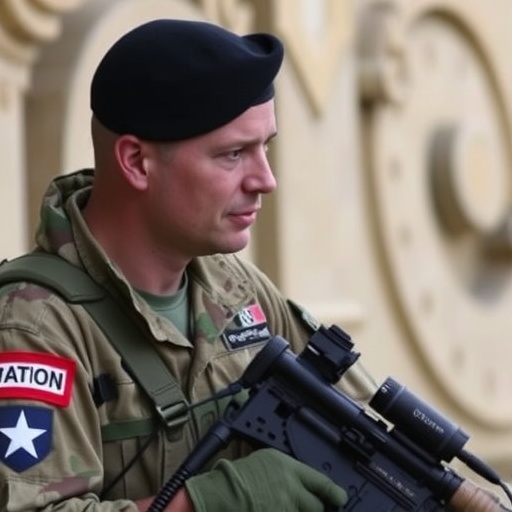In a compelling new study published in PLOS One, Dutch veterans who sustained battle-related injuries during their deployment in Afghanistan report a quality of life that has remained remarkably consistent even a decade after their injuries. This longitudinal research offers important insights into the long-term physical and psychological impact of combat trauma, challenging some prevailing assumptions about the chronic deterioration often associated with war wounds.
The study follows a cohort of Dutch servicemembers injured in combat zones over a ten-year period, carefully assessing their health trajectories across multiple dimensions. Both physical disabilities and mental health metrics were evaluated to provide a comprehensive picture of veterans’ well-being. Such extensive follow-up research is rare, given the logistical and ethical challenges in maintaining contact with injured veterans over long intervals.
One of the notable findings is that the veterans’ self-reported quality of life — encompassing both physiological function and psychological resilience — has not significantly declined compared to assessments made five years post-injury. This stabilization suggests that while the initial impact of battle injuries is profound, many of these individuals achieve a plateau in recovery or adaptation that is sustainable over time. This counters the narrative that combat injuries inevitably lead to progressive physical or mental health crises decades later.
Analyzing patients’ physical health, the research team utilized validated instruments to measure ongoing pain, mobility limitations, and participation in daily activities. Despite facing severe trauma, many veterans reported maintaining adequate functional capacity, allowing them to engage meaningfully in work, family life, and social environments. This persistence in physical autonomy highlights the effectiveness of rehabilitation protocols and underscores the role of medical advancements in trauma care during and after military conflicts.
On the psychological front, the study examined indicators including symptoms of post-traumatic stress disorder (PTSD), depression, and anxiety, which are frequently reported among combat veteran populations. Encouragingly, the prevalence and intensity of psychological distress remained stable or even improved for many subjects over the decade. The data imply that mental health interventions, peer support networks, and adaptive coping mechanisms have a lasting protective effect.
The research methodology entailed repeated surveys and clinical evaluations, with stringent adherence to standardized psychometric scales and physical health assessments. The rigorous approach ensures that the conclusions drawn are grounded in objective, reproducible evidence rather than anecdotal accounts. The study thereby contributes a crucial empirical foundation to an area of military medicine that has often been shaped by conjecture.
Importantly, this investigation also addresses the interplay between physical injuries and mental health outcomes. While it is well-established that physical trauma can exacerbate psychological distress, the study elucidates nuanced patterns. Some veterans show remarkable psychological resilience even amid ongoing physical challenges, hinting at complex biopsychosocial factors that mediate recovery trajectories.
The Dutch military healthcare system’s comprehensive aftercare, which includes sustained access to rehabilitation and psychological support, plays a pivotal role in the observed long-term wellbeing. This model of care, characterized by continuity and multidisciplinary integration, may serve as a template for other countries striving to improve veteran health services.
Furthermore, the study’s findings shed light on the human capacity for adaptation in the aftermath of extreme adversity. The veterans’ ability to sustain quality of life over a decade reflects not only medical and therapeutic interventions but also the dynamic interplay of personal resilience, social support, and meaning-making processes.
This ten-year follow-up contributes to the broader discourse on veteran health by emphasizing that chronic suffering is not an inevitable sequel to combat injuries. Instead, with appropriate care and community involvement, many wounded servicemembers can lead fulfilling lives, challenging stereotypical portrayals of permanently diminished veterans.
The implications extend beyond military medicine into public health and social policy, underscoring the necessity for long-term investment in veteran care programs. It advocates for a longitudinal perspective in assessing health outcomes, recognizing that late effects of trauma may manifest differently across individuals and time spans.
As this study emerges from the Netherlands, it provides a uniquely homogeneous sample with consistent trauma exposure and healthcare access, enabling clear interpretations of long-term recovery patterns. It invites international comparisons and replication in diverse military contexts to enhance the generalizability of these important findings.
In sum, the research propels a hopeful narrative for injured service members and their families, affirming that sustained physical and psychological quality of life is achievable after severe combat-related injuries. It underscores the critical importance of ongoing support systems and raises awareness of factors that foster recovery and resilience over the long haul.
This landmark longitudinal study is not only a testament to veterans’ courage but also a call to maintain and expand comprehensive veteran health initiatives, ensuring that those who serve receive care that spans decades and meets their evolving needs.
Subject of Research: Long-term physical and psychological quality of life in Dutch servicemembers with battle-related injuries sustained in Afghanistan
Article Title: Long-term impact of battle injuries; Ten-year follow-up of Dutch servicemembers injured in Afghanistan
News Publication Date: 12-Nov-2025
Web References: http://dx.doi.org/10.1371/journal.pone.0334622
Keywords: Combat injuries, veteran health, long-term follow-up, quality of life, physical rehabilitation, psychological resilience, PTSD, military medicine, battle trauma, Dutch servicemembers




